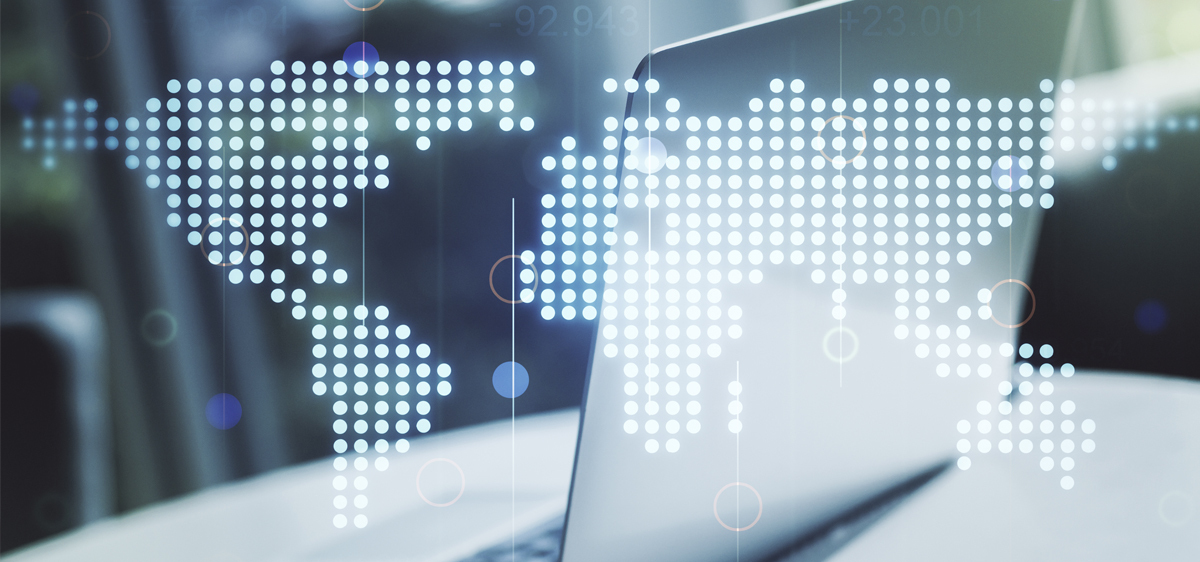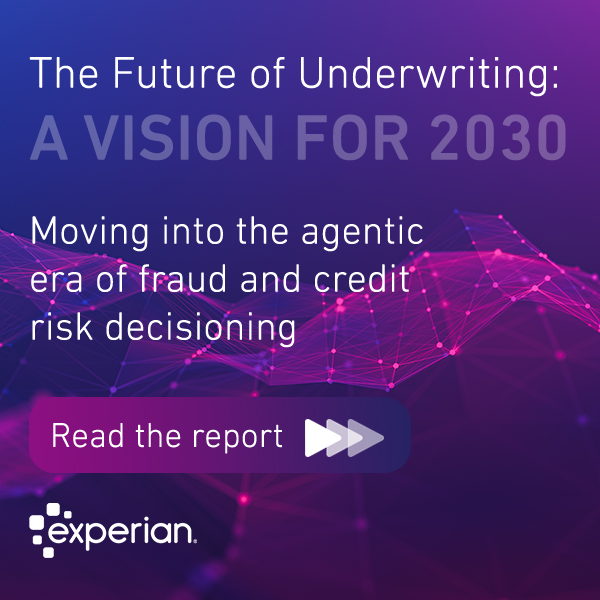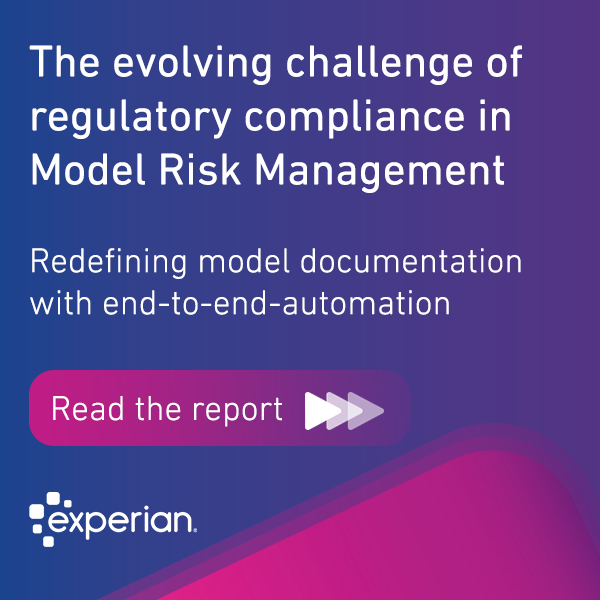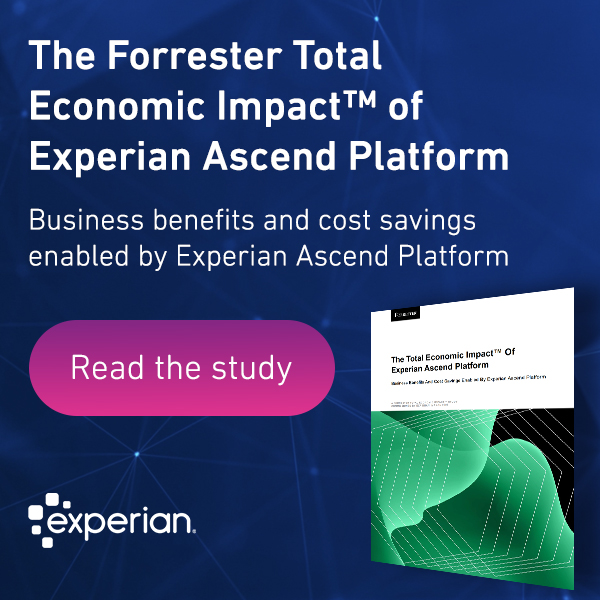World
Thought leadership from around the world

Did you miss these March business headlines? We’ve compiled the top global news stories that you need to stay in-the-know on the latest hot topics and insights from our experts. How to build consumer trust without sacrificing the experience This Forbes article explores the relationship between brand trust and customer experience using the lastest research from Experian. Read about how simple verification methods, personalization and ensuring the use of robust ethical data practices, can be key to driving consumer trust. Using AI for digital identification, fraud prevention, and increased ROI In this IOT for all article, Eric Haller, Vice President & General Manager of Identity, Fraud & DataLabs, covers how investing in AI will not only improve customer experience but also impact a company's bottom line. Digital and online trends in a post-pandemic world Nasdaq #TradeTalks Video Broadcast Series featuring Steve Wagner, Global Managing Director of Decision Analytics, covers what we should expect to see from consumers and businesses in a 2021 post-pandemic world when it comes to digital and online. How current data-driven digital identity impacts businesses and consumers 60 percent of consumers are using a universal mobile wallet to make digital payments according to Experian's latest research. Eric Haller, Vice President & General Manager of Identity, Fraud & DataLabs, talks to CNP about how digital identity solutions that use AI and ML will reduce fraud and improve customer experience when it comes to digital transactions. The sophisticated customer and the need for adaption This Q&A in the Digital Journal with Donna DePasquale, Vice President & General Manager of Global Decisioning, looks at how businesses should respond to consumers seeking a better online experience. Stay in the know with our latest insights:

Did you miss these February business headlines? We’ve compiled the top global news stories that you need to stay in-the-know on the latest hot topics and insights from our experts. Experian launches new anti-fraud platform for digitally accelerated world Financial IT covers the latest on tools to help businesses safely meet the rapid increase in demand for digital services and online accounts. Eduardo Castro, Head of Identity & Fraud, speaks to gaining confidence in preventing fraud while meeting these new business challenges. Experian helps Atlas Credit double approval rates while reducing credit losses by up to 20 percent This Global FinTech Series article provides insights on efforts to make the power of artificial intelligence accessible for lenders of all sizes. Shri Santhanam, Executive Vice President and General Manager of Global Analytics and AI, shares background on constantly-changing economic conditions impacting credit models and how to rapidly develop and deploy models to keep up. 60 percent of consumers are using a universal mobile wallet New research shows a continuing trend toward digital transactions and mobile wallet payments. Steve Wagner, Global Managing Director of Decision Analytics, speaks to consumer and business insights on the increased demand and what businesses need to consider to ensure positive customer journeys that support these shifts. Why digital identity and the customer journey is crucial for today’s businesses Steve Pulley, Managing Director of Data Analytics, explores business opportunities stemming from the massive increase in consumers accessing services online. Taking the right steps not only helps ensure business survival but sustainable success. The key is fundamentals including the customer journey and digital identity. How modern data strategies underpin the digital identity and authentication practices critical to digital transformation In this Datanami article covering our progression toward a 'contactless world,' modern fraud prevention is explored. Dealing with a tremendous amount of data to offer security, while bearing in mind customer convenience, requires sophisticated technology. Holistic approaches both improve operations and helps keep pace with fraudsters to protect customers. Stay in the know with our latest insights:

Don't miss out on the top January headlines, including the latest coverage from our global experts, including the digital identity landscape, impacts of pandemic fatigue, protecting users and their experience, Covid-19 impacts on businesses in India, and consumers' digital experience expectations. Experian selected as leading provider of digital identity This MarTech Series article looks at Juniper Research's Digital Identity: Technology Evolution, Regulatory Landscape & Forecasts 2020-2025 report. David Britton, Vice President of Industry Solutions, offers his perspective on providing both convenience and security. In 2021, loyalty shouldn't be assumed Destination CRM covers findings of the recent Experian Global Insights report, which indicates that consumers might not be as patient with businesses for much longer. The impact of "pandemic fatigue" translates to an end in consumer acceptance of the pandemic as an excuse for poor service. Establishing and protecting user identity in a digital world Eric Haller, Executive Vice President & General Manager, Identity, Fraud & DataLabs, speaks to the rise of digital and the impact on the need to be able to identify an individual. Relying on technology to help deliver a good user experience is key to avoiding too much friction in the process. 99 percent of businesses in India implement digital online strategy to recognise customers; highest in APAC: Experian Report#TradeTalks: Increasing consumer demands and expectations Business Standard looks at recent global research findings on consumer and business economic outlooks, financial well-being, online behavior, and more. Most prominently, the vast majority of Indian businesses implementing strategies to recognize customers across platforms. The top three reasons people abandon online transactions In this Global FinTech Series article, Chris Fletcher, SVP Decision Management & Cloud Services, explores the current environment of online transaction explosion and what it means for businesses to accommodate this lasting preference for digital. It will be key for each transaction to align the need for security with the right level of friction to the consumer. Stay in the know with our latest insights:

Get the latest from our global experts with these top December headlines, including meeting the demand for digital, increasing consumer expectations, women leading artificial intelligence, and protecting against fraudsters over the holiday shopping season. Investment priorities to meet consumer demand for digital banking In this BAI Banking article, Chris Fletcher, SVP Decision Management & Cloud Services, explores the investment required of financial institutions to transform their use of data and analytics and deliver on credit risk strategies. What’s the proper path for better payments? In context to consumers’ digital expectations post-Covid-19, Progressive Grocer considers the future of payments in food retail and beyond – with contactless payment options already rolling out at a large drug store chain. Wisdom from the women leading the AI industry, with Laura Stoddart of Experian Authority Magazine speaks with Laura Stoddart, Data Scientist, about her career path, her experiences working on ethical AI and using emerging datasets to evaluate risk as well as her thoughts on the future of this industry. #TradeTalks: Increasing consumer demands and expectations Steve Wagner, Global Managing Director of Decision Analytics, joins Nasdaq’s Jill Malandrino to discuss recent research findings on increasing consumer demands and digital expectations, and ongoing considerations for a post-Covid-19 world. A holiday season like no other: What to know to guard your company against fraud Itay Levy, Forbes Councils member and CEO and Co-Founder of Identiq, provides his perspective on the increased preference for online shopping and the need to strike the right balance between customer experience and efforts to mitigate fraud. Stay in the know with our latest insights:

The need for advanced technologies, such as artificial intelligence, has surged in the wake of Covid-19. The strain of the pandemic on businesses and economies has created tension in operational models requiring a quick and dramatic response to this digital disruption. As transformation efforts continue, there are several considerations for the growing field of AI – including ethical AI, the need for diversity and gender balance, and striving to be consciously unbiased. This final post in our “Game Changers: Women in AI” series takes a deep dive into AI careers. Our experts share important lessons on how to thrive, including having mentors and sponsors, staying relevant with new related skills, understanding problems to be solved, believing in yourself and actively seeking growth opportunities. New to the Game Changers: Women in AI series? Read Part 1 - Game Changers: Women in AI Read Part 2 - Game Changers: Women in AI Q: What advice would you give to help other women in AI thrive? He: "I would suggest being brave. Don't be afraid of trying new things. Sometimes we fear we cannot do something, but once you try it you find it’s not very difficult, you can do it. You can do it very well. So, I think the first thing is just try it. Don’t be afraid of making mistakes. If you go this route, be confident. Women are very smart and competitive, but they may not recognize how good they are. Also, if you find that you may be interested in this area, find resources and see if this is something you want to dedicate yourself to. There are a lot of options online. Even a lot of the universities now offer their courses online. People also share code online, so there are lots of good resources to help you explore and start learning. Overall, remember to believe you can do it." Kazmi: "For everyone that wants to try AI, or if you’re already working here and want to remain in the industry and do good work, you have to keep yourself relevant — learning and keeping yourself updated with the newest research that's happening. There is no end to learning in this field. At the same time, you need to have business knowledge to truly understand a business problem statement and convert that to a data science problem statement, and then start developing solutions for it. I really think that women can be strong contributors in this regard by leveraging their management and analytical skills to bridge the gap between the two areas." Kung: "I think we all need to be ourselves and respect ourselves. You need to have a goal and work hard for it. I think it is the same for anyone who wants a successful career. You need to set a goal and work hard for it and you will achieve it. Really, it's all about working hard. Also, my experience in AI has included a lot of brilliant women, so I never really felt like this is a job for men vs. women. The truth is we want more people to understand what we are doing – that there are many great things we can do with data. It is not something to fear. It’s not this magical thing. It is statistics. It is computing. It's coding. It's everything good." Peters: "It's so important to reach out and look for both mentors and sponsors, and this can be at any age. Mentors are our sounding boards to help with career development. There's some overlap with sponsors, who are opening the doors and speaking about you on your behalf in order to accelerate the track to the next place that you want to be. Mentors and sponsors are good starting from a very young age – and I think that’s a critical aspect of bringing more women along. Find these folks, make those connections, nurture those relationships, and have those mentors and sponsors. I really think that's a key aspect. Also, women do not necessarily need their network to be all women. You need to find the best people positioned to help you in your journey." Stoddart: "Having a mentor is good, especially someone who's more senior in your target field. And, it doesn't necessarily have to be somebody who you're working with or somebody who's your boss. They can be from academia or a different company. It's nice to have the outside perspective. It’s also helpful to network – I’m using virtual events now. I’ve met a lot of women in data science through activities outside of my current role. There are so many opportunities beyond your day to day job. I try to have a few things going at once -- I'll mentor somebody, I'll have a side project or volunteering, and my full-time job as well. For example, for the social enterprise I'm working with, I'm getting experience forecasting. It's nice to give back, but it also makes you a stronger data scientist to work on these different projects." Q: Is there a person or experience you are grateful towards that helped set you on the path to where you are today? He: "First, after graduation, I got a job in transaction analytics, detecting fraud transactions in credit cards. Essentially, it has the same goal as other projects, understanding human behavior from large amounts of data. That's what amazed me and kind of drove me into this direction. After that, I got the job here at Experian and I was exposed to a lot of great innovations and projects." Kazmi: "In the eight and a half years I’ve been in the AI industry, I’ve had the opportunity to work with multiple organizations across different domains. Through this diverse experience, I’ve met and worked with women from different backgrounds both as leaders, as well as colleagues. I’ve seen successful women leaders from all walks of life – from different educational backgrounds, whether from computer science, engineering, mathematics, or economics management, et cetera, or even differing nationalities and ethnicities. It has been impactful to see successful women leaders cutting across industries and localities." Kung: "Professionally, the person that I'm grateful to is my first boss. He was a teacher for me and taught me a lot. Everything that I am today, everything that I do at work, professionally, he was who trained me for it. When I think of the professional Jennifer, I always think of him. I think in my whole career, everyone who was part of my path, they helped me somehow. Maybe in little ways, and maybe in some big ways, they all helped me." Peters: "There are so many people I am grateful to in my career. Overall, where I am today comes down to the opportunities I was given. I had the opportunity earlier on in a prior role to be exposed to big data and frameworks, an exciting precursor to my work with AI. Today, when I think about my work with fraud and identity, AI is such a critical piece of that. And it's becoming increasingly important as we apply these concepts into financial services. I’ve been able to join collaborative and innovative colleagues, fraud experts, in a unified quest to solve the fraud challenge." Stoddart: "I am grateful to the person who brought me into this department. He saw something in me, he understood that I really wanted to learn, and he created a position for me. They were not hiring for a data analyst at the time, so that was really energizing. Also, I don't look for positions that already exist, because if everybody applies for positions that exist, it’s limiting your scope. A lot of the things that I've obtained in my life, it's because I've been a bit brave and asked for it. Even if it's not there on a plate, here I am." Related stories: New Podcast from AI in Business: The evolution of the data business in the age of AI Game Changers: Women in AI (part 1) Game Changers: Women in AI (part 2) Yi He Yi He works as a data scientist in the Experian NA DataLab. She is dedicated to using machine learning and AI to extract information from large amounts of data to identify, understand and help people, and prevent fraud. She aims to bridge online and offline worlds by linking identity data from these unique sources. With a focus on minimizing friction to customers, Yi’s work helps organizations identify synthetic identities to avoid fraudulent applications. Recently, she contributed to a Covid Outlook & Response Evaluator (CORE) Model – a “heat map” of geographic populations across the U.S. most susceptible to severe cases of Covid-19. Deeba Kazmi In her role as a data scientist at the Experian APAC DataLab, Deeba Kazmi is focused on solving business problems with analytics, including the development of consumer and small to medium enterprise credit risk models that leverage alternative data. Deeba is passionately focused on leveraging AI to create solutions that can help address issues faced by developing markets. Most prominently, this work includes her data science leadership contributions to solving a crucial economic and societal problem – financial inclusion. This effort is helping disadvantaged socio-economic consumer groups gain access to vital credit and financial services by leveraging the power of technology to deliver better outcomes. Jennifer Kung Jennifer Kung is an analytics consultant for Serasa Experian Decision Analytics, where she combines her knowledge of financial services with her data analysis expertise. Jennifer aims to harness the power of data through robust, descriptive and predictive analytical solutions to help clients realize the benefits of the massive amounts of data available to them. She recognizes the magnificence in powering discoveries through data analysis and enjoys revealing these capabilities to businesses who can benefit from these robust, yet approachable solutions. Jennifer enjoys knowing that her work helps to simplify and accelerate decisions that consumers rely on at important times in their life. Kathleen Peters Kathleen Peters leads innovation and business strategy for Decision Analytics in North America. As the prior Head of North America Fraud & Identity business, Kathleen is well-recognized as an identity industry innovator, being named a “Top 100 Influencer in Identity” by One World Identity the last two years. As of 2020, Kathleen was named Chief Innovation Officer for Decision Analytics. Kathleen and her team rely on the power of AI to continuously find new ways to solve customer challenges by defining product strategies, new paths to market and investment priorities. Underlying these efforts is a key focus on the ethical use of technology and the need to be consciously unbiased. Laura Stoddart Laura Stoddart is a physicist turned data scientist who works at the Experian DataLab in London. From her first exposure to AI, she recognized how quickly it can have an impact on the world, which has driven her to get and stay involved in the industry – both professionally and personally. Laura’s recent work has focused on ethical AI, having recently contributed to her first paper addressing the removal of bias from models. In addition, she is concentrated on leveraging emerging datasets to evaluate risk. Outside the DataLab, Laura also volunteers her data science skills to good causes such as Bankuet and helps expose others to the world of AI through mentoring.

Consumer demand has shaped the way businesses worldwide have adjusted or intend to adjust operations and investments throughout the pandemic. Businesses that have struggled to meet the new expectations of consumers will need to meet ever-changing conditions with careful investment and data-driven analyses. Experian’s latest Global Insights Report shows two-thirds of consumers globally have remained loyal to their favorite brands during the pandemic. Brand loyalty was found to be the highest in India, at 80%, and lowest in France, with a bit more than half, at 57%. However, loyalty may not be a given going forward. Competitive differentiation is founded on how you engage customers, at every interaction. Our research shows that loyalty is intrinsically linked to trust, security and convenience. Payment system providers, such as PayPal, have retained the top spot for customer loyalty for three years in a row, but there continues to be movement among the remaining top five industries. This fluctuation, indicative of consumer preferences and behaviors, is fueled by the varying speed at which businesses globally are transforming front- and back-end systems. Particularly, this holds true for the pace of digitization of credit risk and fraud risk operations. Leverage data to retain loyalty Consumers have higher expectations than ever before, and businesses need to meet or exceed these expectations by adapting to correlate with the dynamic nature of the customer journey throughout the continuing pandemic. The report also found that 60% of people have higher expectations of their digital experience than before Covid-19, increasing the need for businesses to make sure that they are leveraging data to benefit their customers, providing secure and convenient digital experiences. Although most customers have shifted to digital and prefer the conveniences of online, mobile and contactless transactions, concerns over data security remain. In response, businesses need to carefully navigate customer experiences to ease apprehension. A great example is the trust, and therefore loyalty, that can be established by using customer data for identity authentication. Customers gain protection while enjoying a hassle-free experience that is non-threatening and transparent. Some businesses recognize these needs, with 40% reporting they are doing a better job communicating how customer data is used to enhance the customer experience, protect consumer information and personalize products and services. Integrating data, analytics and technology Our survey also found that only 24% of businesses are deliberately making changes to their digital customer journey. However, many of them have intentions of making changes and are increasing their budgets in order to do so. Three of the top five solutions businesses are using to help improve the customer journey are designed for driving insights into faster customer decisions. Of these top five solutions, the use of AI to improve customer decisions ranks first amongst banks, payment providers, and retailers ranks first. Companies who are, or plan to, accelerate the implementation of AI can make faster, smarter data-driven decisions to better serve consumers. The key to better serving customers lies in a business’s ability to integrate data and decisioning technology to deliver fast and relevant products and services. In fact, the study found that one in three consumers are only willing to wait 30 seconds or less before abandoning an online transaction, including accessing their bank accounts. With such a short window to keep the customer engaged, faster decision making is imperative to not only retaining a customer’s loyalty on a long-term basis but getting them to commit to a transaction once. Businesses, particularly retailers and financial services who implement the necessary technologies will help move economies from sustainability mode towards a future of growth but cannot do so without continued consumer demand. While customer loyalty does remain, it is up to businesses to adapt and accommodate to retain, and potentially increase the impact of these adjustments. Regardless of where they’re transacting, consumers expect a secure, convenient experience—and they’ll quickly abandon transactions if they’re let down. So, businesses must keep their focus on transformation. Discover more insights from our longitudinal study of the impact of Covid-19 on businesses and consumers.

Explore these November headlines to stayin-the-know. Coverage includes forward-looking fraud prevention, International Fraud Awareness Week, and consumer and business research takeaways from our global experts. Fraud prevention strategies to prepare for the future Chris Ryan, Senior Fraud Solutions Consultant, provides tips on proactively combatting fraud risks to be positioned for success in a post-Covid-19 world — including categorizing fraud and using advanced analytics and technology to keep pace. #IFAW2020 Interview: David Britton, VP of Industry Solutions, Experian For International Fraud Awareness Week, David Britton, Vice President of Industry Solutions, speaks with Infosecurity Magazine about the current fraud landscape, common fraudster tactics, and best practices for preventing fraud. Only 30 seconds to impress — meeting APAC consumers’ online expectations Sisca Margaretta, Chief Marketing Officer for Experian Asia Pacific, explains why speed, seamlessness, and a thoughtful user experience are no longer nice-to-haves, but musts in today's environment. Pandemic entitlement: Consumers demand more online, Experian finds This MediaPost article explores business sentiment verse consumer expectations for their digital experience in the wake of Covid-19, with insights on how businesses can win from Steve Wagner, Global Managing Director of Decision Analytics. Are APAC banks equipped to help consumers in financial distress while juggling credit risk? Ben Elliot, CEO, Experian Asia Pacific, discusses the impact of Covid-19 on consumer financial wellbeing and spending power, and what the financial services and insurance industries can do to help those in financial distress while effectively managing credit risk. Stay in the know with our latest insights:

The relationship with artificial intelligence may have started with robots but its integration into the way people interact with the world today looks very different. AI is in our pockets, our homes, our workplaces, and its pay-off is being realized across many industries, including financial services, e-commerce, telecommunications, streaming services, insurance companies, and more. Though some people and businesses still have reservations about its use. In the next article in our “Game Changers: Women in AI” series, we examine the artificial intelligence debate with arguments against and for its use in our everyday lives, and how it can bring real value to our interactions with businesses – whether it’s preventing fraud, increasing financial accessibility, enhancing the digital experience or supporting public initiatives to prevent the spread of Covid-19. Q: What is your view on criticism of AI or arguments against its use? He: "AI is already all around us and sometimes people don’t even realize it. For example, smart devices remember your preferences, try to understand your behaviors, and help you with reminders, goals, or some other alert. For some, this can feel a little bit scary, like they are collecting information and profiling you. But really, AI is helping people by using large amounts of data to train models and find patterns in the information to solve complicated problems." Kazmi: "Since AI is still so new, every time a product or a change in experience through AI is introduced, there are bound to be reluctancy in adoption and initial failures which lead to opposition. But, to establish the final best product possible, we need understanding between AI research teams and business stakeholders. Take the example of Elon Musk. He has come up with SpaceX and Tesla, but there have been so many failures in their development. Still, the entire world was looking up to these ventures, because these products are something that's going to bring huge positive change." Kung: "People need to keep in mind that AI, and all this data science technology, are just tools to help us. It's not that a machine will replace someone. I’ve heard a lot of people saying, "You create things automatically, and machines will replace our job." That’s not how it is. The truth is, we are creating these kinds of things to help us. It improves our lives by saving our time to focus on other useful things that a machine can’t do." Peters: "It’s helpful to consider what got us here. Years back, people would ask, “Are you ready for big data? Do you have big data?” What we found was that as more data was available, even when managed effectively, we needed ways to consume it and to garner insights from it. This underlying piece drove the need for AI and machine learning. Working with these technologies is critical to harnessing the power of data for what we do, to apply these concepts to fuel significant problems, like stopping fraud." Stoddart: "The topic of bias in AI creeps up in the news. If an algorithm is not checked properly, it could mean a portion of the population isn’t reflected. This stems from assumptions inherent in people. If those writing the code are not diverse, you likely miss out on representing whole groups of people in the wider society. This issue of bias emphasizes the importance of team diversity, of driving success by having opinions challenged and ensuring representation across diverse groups." Q: Is there anything you would like to share that could help alleviate fears and show the public that AI is beneficial? He: "It will lessen fears if we can help people realize there needs to be humans involved. To understand the data, to understand human behavior, everything is about the observation and how you interpret it. It also helps to share the benefits people will realize. For example, AI can improve consumer experiences — such as when filling out an application. It can build bridges between different types of data to supplement the details provided. This reduces the friction felt by the applicant by simplifying the inputs required, which is very useful on wearables and mobile devices." Kazmi: "AI can change the world. If you just look around, data science is part of everything nowadays. And, there's often a solution you benefit from but are not even aware that it has AI embedded in it in some way. It’s important to encourage understanding and acceptance and highlight all the good work that people are doing in this industry. We need to acknowledge and encourage endeavors to further these contributions and progress in the AI industry." Kung: "My concern is that people think “Oh, you just put something in the machine and the machine will tell you what to do." It's not like that. People need to realize a human must analyze the results – what it gives you and what you see. It needs to make sense for their business. The machine will not know what you’re analyzing. It will just run the algorithms that you put in it and it gives you a number. It’s up to people to analyze it." Peters: "Whenever you go into a new and somewhat unexplored area, there will always be different aspects to consider. As researchers, innovators, and developers, we need to be aware of inherent risks and keep an eye on the ethical aspects of technology. This focus helps ensure the thoughtful progression of AI, creating the right guardrails to thwart fraudsters and ill-intentioned individuals and equality by being “consciously unbiased” in the models and systems we are building." Stoddart: "I mentioned the need for diversity to prevent bias. I’m proud to be contributing to a project called “fairness.” It’s about tackling bias in models – using AI to help treat everyone fairly. Our work has enabled people to drill down and properly check attributes to ensure that decisions are fair and not discriminating against a certain group. If it’s not fair, it provides the opportunity to fix it. I believe this will be a really important tool going forward." Q: What examples can you share for how AI can bring goodness to the world? He: "At the very beginning of our latest initiative, we were thinking, “how will this development and innovation help the world?” It was hard to answer until we created different use cases. Currently, we have several meaningful results using AI – linking data to identify a person and deliver the best customer experience and helping detect fraudulent applications using fake or synthetic IDs. We also recently developed a heatmap for predicting Covid-19 severity for more than 3,000 counties in the U.S. We’ve made this tool available to assist public researchers as well as government and policymakers." Kazmi: "I am truly satisfied with the work that I have been doing because it's very exciting to find new ways to have a positive impact. From the day I joined Experian, I've been part of a project called financial inclusion, leading the data science part of it. We are helping people and entities stuck at the lowest level of the financial ladder. This is the beauty of data science, helping consumers and small entities access credit and come out of a vicious cycle, to move up financially, leading to the overall growth of the financially weaker sections of society." Kung: "Within my area of focus, financial services, we can help make life easier and help get things done faster. The important thing is time-saving because we need to get things done quicker. For example, sometimes people try to secure credit and the bank takes too long to give an answer. Or, with a mortgage, there is a lot of paperwork needed. We can use an AI tool to help analyze this paperwork faster, which helps the customer who needs the loan get their home faster." Peters: "Some of the ways that it can bring goodness to the world is where we are just limited by the scale or the speed that we want to move when solving problems based on huge amounts of data, especially in real-time. Where AI can help predict next best actions or best outcomes in a way that usually would require a lot of research or photographic memory. Very relevant today, this applies well to the medical domain, but there are so many areas AI can help us better consume data at our fingertips and predict new innovative areas to explore." Stoddart: "In addition to the fairness project I mentioned, I also use my data science skills volunteering with a social enterprise, helping them obtain the insights they need to determine what food and supplies are most needed at food banks. The insight allows them to prioritize what items to buy in bulk with monetary donations from the public. Usually, food banks are really separated in the UK, so this is a new approach benefitting from advanced technologies." Related stories: Game changers: Women in artificial intelligence (part 1) Impact of technology on changing business operations Forbes: Are we comfortable with machines having the final say? Yi He Yi He works as a data scientist in the Experian NA DataLab. She is dedicated to using machine learning and AI to extract information from large amounts of data to identify, understand and help people, and prevent fraud. She aims to bridge online and offline worlds by linking identity data from these unique sources. With a focus on minimizing friction to customers, Yi’s work helps organizations identify synthetic identities to avoid fraudulent applications. Recently, she contributed to a Covid Outlook & Response Evaluator (CORE) Model – a “heat map” of geographic populations across the U.S. most susceptible to severe cases of Covid-19. Deeba Kazmi In her role as a data scientist at the Experian APAC DataLab, Deeba Kazmi is focused on solving business problems with analytics, including the development of consumer and small to medium enterprise credit risk models that leverage alternative data. Deeba is passionately focused on leveraging AI to create solutions that can help address issues faced by developing markets. Most prominently, this work includes her data science leadership contributions to solving a crucial economic and societal problem – financial inclusion. This effort is helping disadvantaged socio-economic consumer groups gain access to vital credit and financial services by leveraging the power of technology to deliver better outcomes. Jennifer Kung Jennifer Kung is an analytics consultant for Serasa Experian Decision Analytics, where she combines her knowledge of financial services with her data analysis expertise. Jennifer aims to harness the power of data through robust, descriptive and predictive analytical solutions to help clients realize the benefits of the massive amounts of data available to them. She recognizes the magnificence in powering discoveries through data analysis and enjoys revealing these capabilities to businesses who can benefit from these robust, yet approachable solutions. Jennifer enjoys knowing that her work helps to simplify and accelerate decisions that consumers rely on at important times in their life. Kathleen Peters Kathleen Peters leads innovation and business strategy for Decision Analytics in North America. As the prior Head of North America Fraud & Identity business, Kathleen is well-recognized as an identity industry innovator, being named a “Top 100 Influencer in Identity” by One World Identity the last two years. As of 2020, Kathleen was named Chief Innovation Officer for Decision Analytics. Kathleen and her team rely on the power of AI to continuously find new ways to solve customer challenges by defining product strategies, new paths to market and investment priorities. Underlying these efforts is a key focus on the ethical use of technology and the need to be consciously unbiased. Laura Stoddart Laura Stoddart is a physicist turned data scientist who works at the Experian DataLab in London. From her first exposure to AI, she recognized how quickly it can have an impact on the world, which has driven her to get and stay involved in the industry – both professionally and personally. Laura’s recent work has focused on ethical AI, having recently contributed to her first paper addressing the removal of bias from models. In addition, she is concentrated on leveraging emerging datasets to evaluate risk. Outside the DataLab, Laura also volunteers her data science skills to good causes such as Bankuet and helps expose others to the world of AI through mentoring.

The artificial intelligence (AI) market is expected to grow 159% by 2025 to $190.61 Billion, according to Markets and Markets, and there’s considerable value for businesses and consumers. In our July global survey of businesses and consumers, we found that 60% of businesses planned to invest in advanced analytics and AI to better support their customers' financial needs during Covid-19. As more businesses adopt AI, processing their vast amounts of data with advanced analytics for automated decisions, human oversight is and will remain key to ensure transparency and explainability. This “human element” in AI was the inspiration for our latest “game changers” series. We recently sat down with five industry experts to get their view on how AI is making the world a better place, and how its use in financial services can be realized. Yi He, Deeba Kazmi, Jennifer Kung, Kathleen Peters, and Laura Stoddart are visionaries and leaders in data science and innovation making a real difference in how advanced technologies are helping consumers and businesses engage more meaningfully. Q: What excites you most about the AI Industry? He: "As AI is more involved in our lives, it provides benefits we couldn’t imagine before – such as using your face to unlock your phone security. With the development of AI and machine learning, we can find patterns in data or in behaviors of people to solve complicated problems. That’s really it; helping people make life easier." Kazmi: "The main thing is that AI is not only transforming the way we live and communicate, it's changing the way almost every industry around the world is going to operate. To positively contribute to this growth, it’s not just that you need to learn and then deliver, but to keep innovating and coming up with new solutions that others learn from." Kung: "The technology improvement excites me. Things are getting easier, giving us more time to focus on what really matters. We usually don’t have time to focus on some of these areas because we are used to doing things manually. Now with AI, we have a machine to do a job that is manual, so we can focus on analysis and improvement." Peters: "What’s most exciting for me are ways AI technology can augment human decisions and innovation, in new directions that we historically run out of horsepower for. And, it can be applied to virtually every industry — the ways that it can better help us leverage big data, robotics, the Internet of Things — there are so many directions we can go with AI." Stoddart: "One of the most exciting things about AI is that people benefit from it every day — using social media, or maps to get to the shops, sometimes without even realizing it. And, if you can create an algorithm that can help somebody get credit who previously couldn't, you can have a real impact on the world that actually changes people's lives for the better." Q: What concerns you most about the AI industry? He: "I think the key things are data security and privacy protection. People are more and more sensitive about their information being used and released, which is understandable, and why opportunities exist to opt-out of information being used or sold to third parties. The key is to offer comfort by building in how to secure the data and protect privacy." Kazmi: "There are pros and cons of everything, especially with a stream of faster evolutions in prominent areas affecting our day-to-day lives. Since it’s still so innovative, when AI is introduced, there’s bound to be reluctance. But, to progress, we need acceptability, encouragement and patience; an understanding between AI research and stakeholders that these developments are going to bring huge positive change." Kung: "My main concern is that we need to keep in mind that AI is just a tool to help us. The machine will not replace humans and it cannot tell you what to do. An algorithm can give you a number based on its design. You need to analyze that result and ensure decisions make sense for your business." Peters: "The more we know and learn about AI, the better we can anticipate potential risk areas. These include the ethical aspects of technology, and striving to be consciously unbiased. As we progress, explainability and other model governance practices will help us stay within the right guardrails and mold the necessary regulations." Stoddart: "Lack of diversity concerns me – both in the boardroom and on the programming side. Decisions that we make in our programming are based on assumptions as human beings and our lived experience. If the people writing the code are not diverse, you’re missing out on whole groups of people in the wider society." Q: Can you share with us the “backstory” of how you decided to pursue this career path? He: "My educational background includes cognitive science, neuroscience, and psychology, and it involved a lot of data analysis and modeling. I wanted to understand how humans behave. In my first job, I did essentially the same work — understanding human behavior from large amounts of data — but to detect fraud. That amazed me and driving my focus today." Kazmi: "My education included subjects around analytics, and had a lot of flavor of data science, predictive modeling, mathematics and statistics. AI was very new at the time. I studied these topics and began to understand how data science is developing, and what's the future of it. I really got excited and interested into it. And once I started my career, there was no looking back." Kung: "As a child, I thought I wanted to be an engineer. Statistics was my second choice. But, I am really glad I had the opportunity to follow this path, because statistics and data analysis are amazing. When I started my course, I was so amazed at how data analysis can help you discover a world. You can do anything with data. I realized that this was my true passion." Peters: "I became interested in AI from the business aspects – working in a big data environment, we really needed machine learning and AI to handle data at scale. When joining Experian in the identity and fraud area, our mission was clear – harnessing the power of one of the largest data assets in the world to make a difference; finding new ways to stop fraud." Stoddart: "I studied physics at university and attained a master's in particle physics. But, during my final year, I started to learn about AI and machine learning. It was inspiring, especially how quickly they can have an impact on the world compared to academic research, which can be over many years. Realizing how quickly it was progressing, I thought it would be really exciting to get involved." Q: Can you tell our audience about the most interesting projects you’re working on now? He: "Recently, I’ve been working on use cases and projects surrounding identity. We have been working to link identity data from various sources – online and offline. Here at Experian, we have information from many sources, across different business areas. This project is providing a platform to link all this data together, which in the past was not very easy to accomplish. With this platform to provide linkages, it provides a 360-degree view of a person and helps provide conclusions such as whether two identities are the same person. To do this, we utilize machine learning techniques and AI. It’s very exciting." Kazmi: "I would like to mention something I'm very proud of, which has been a turning point in the way I look at data science solutions. I have the privilege of playing a prominent role in solving for a crucial economic and societal problem of the world, financial inclusion. This issue has historically blocked growth for financially weak and less established sections of society. I am leading data science as part of the initiative, exploring different sources of information beyond credit history, to increase access to financial products. This is the beauty of data science and how it helps us." Kung: "At Experian, I work in a consulting area, so I advise our customers and show them the power of data. Often, it’s not easy for a client to recognize this power. That’s our job – showing them how data can help their business or their decisions. We developed a credit decisioning model for one client using machine learning. This showed them how powerful it can be to use the data we make available to them. They were so amazed with the results. It was a really great experience." Peters: "The newest aspect of my role is leading innovation and strategy for decision analytics in North America. I am constantly on the watch for opportunities to incubate and try to apply Experian’s data and analytics and AI capabilities to solve new problems. We are looking at the role of identity and how we might apply capabilities in new ways. There is an expansion of needs, especially as the world evolves, and how we’re identified is evolving. So the application of Experian’s differentiated capabilities to new areas and markets is an area of focus of mine that I'm really excited about right now." Stoddart: "One of the most interesting projects I've worked on since joining the lab is around fairness of machine learning algorithms, decision-making. It’s about tackling the bias that can come when you use machine learning in a real world scenario. This happens when an algorithm is not being checked properly and it's discriminating against a certain group. To be part of building this vision about treating everybody fairly is great. Especially to be part of a company that values this effort and recognizes that it's going to be increasingly important going forward." Related stories: What is the right approach to AI and analytics for your business? Four fundamental considerations Maximizing impact from AI investment: 4 pillars of holistic AI Forbes: Are we comfortable with machines having the final say? Yi He Yi He works as a data scientist in the Experian NA DataLab. She is dedicated to using machine learning and AI to extract information from large amounts of data to identify, understand and help people, and prevent fraud. She aims to bridge online and offline worlds by linking identity data from these unique sources. With a focus on minimizing friction to customers, Yi’s work helps organizations identify synthetic identities to avoid fraudulent applications. Recently, she contributed to a Covid Outlook & Response Evaluator (CORE) Model – a “heat map” of geographic populations across the U.S. most susceptible to severe cases of Covid-19. Deeba Kazmi In her role as a data scientist at the Experian APAC DataLab, Deeba Kazmi is focused on solving business problems with analytics, including the development of consumer and small to medium enterprise credit risk models that leverage alternative data. Deeba is passionately focused on leveraging AI to create solutions that can help address issues faced by developing markets. Most prominently, this work includes her data science leadership contributions to solving a crucial economic and societal problem – financial inclusion. This effort is helping disadvantaged socio-economic consumer groups gain access to vital credit and financial services by leveraging the power of technology to deliver better outcomes. Jennifer Kung Jennifer Kung is an analytics consultant for Serasa Experian Decision Analytics, where she combines her knowledge of financial services with her data analysis expertise. Jennifer aims to harness the power of data through robust, descriptive and predictive analytical solutions to help clients realize the benefits of the massive amounts of data available to them. She recognizes the magnificence in powering discoveries through data analysis and enjoys revealing these capabilities to businesses who can benefit from these robust, yet approachable solutions. Jennifer enjoys knowing that her work helps to simplify and accelerate decisions that consumers rely on at important times in their life. Kathleen Peters Kathleen Peters leads innovation and business strategy for Decision Analytics in North America. As the prior Head of North America Fraud & Identity business, Kathleen is well-recognized as an identity industry innovator, being named a “Top 100 Influencer in Identity” by One World Identity the last two years. As of 2020, Kathleen was named Chief Innovation Officer for Decision Analytics. Kathleen and her team rely on the power of AI to continuously find new ways to solve customer challenges by defining product strategies, new paths to market and investment priorities. Underlying these efforts is a key focus on the ethical use of technology and the need to be consciously unbiased. Laura Stoddart Laura Stoddart is a physicist turned data scientist who works at the Experian DataLab in London. From her first exposure to AI, she recognized how quickly it can have an impact on the world, which has driven her to get and stay involved in the industry – both professionally and personally. Laura’s recent work has focused on ethical AI, having recently contributed to her first paper addressing the removal of bias from models. In addition, she is concentrated on leveraging emerging datasets to evaluate risk. Outside the DataLab, Laura also volunteers her data science skills to good causes such as Bankuet and helps expose others to the world of AI through mentoring.

We’ve compiled the top October headlines from across the globe to keep you in the know on the latest hot topics and insights from our global experts. Q&A: Consumer and business outlooks since Covid-19 David Bernard, Senior Vice President of Global Marketing and Strategy, provides his perspective on consumer demand for digital banking and business preparedness. #TradeTalks: The Shift in Online Trends as a result of Covid-19 In this Nasdaq #TradeTalks podcast, Steve Wagner, Global Managing Director of Decision Analytics, discusses how Covid-19 is driving consumer behavior change and accelerating the shift to digital. 43% of Indian consumers record decline in household income: Experian Global The Economic Times covers global research findings on the impact of the Covid-19 pandemic on Indian consumer income, with insights from Sathya Kalyanasundaram, Managing Director, Experian India. Qual será a velocidade da retomada da economia brasileira em 2021? This Estado de Minas article explores viewpoints on what the state of the Brazilian economy will be in 2021, citing current trends across different sectors. TechBytes with Marika Vilen, SVP Platform Commercialization, Global Identity & Fraud at Experian MarTech Series speaks with Marika Vilen about meeting customer needs in the 'new normal,' managing identity and fraud prevention strategies, benefits of device intelligence, and industry trends. Stay in the know with our latest insights:

To keep you informed, we’ve gathered the top global, August headlines covering the latest insights from our experts and recent hot topics. Email attack type: Account takeoverZDNet Japan covers ATO (account takeover) fraud and the variety of techniques used in this attack type to access user accounts and ultimately steal money or sensitive information. In today’s rapidly changing economy, businesses need to get consumer recognition rightDavid Britton, VP of Global Identity & Fraud, shares insights on the disparity between businesses' confidence in recognizing consumers and consumers' lower confidence in this capability by these businesses. EDBI invests in fraud protection fintech VestaThe Straits Times, Singapore, provides an overview of this investment, including details around the increase in online fraud losses recognized across the Asia Pacific (APAC). How banks can balance UX and security amid a pandemicThis Forbes article explores the impact of Covid-19 on consumers, including the critical need for banks to balance consumer protection and good user experience. Stay in the know with our latest insights:

The global pandemic led to swift and unexpected shifts in consumer behavior, from the significant increase in the use of digital channels, to the decrease in ability to pay for many. Based on this environment, we’ll highlight where senior financial services executives should focus their analytics and decisioning teams’ efforts to provide a bit of certainty in an uncertain time: Confidence and demand for credit First off, it’s important that lenders consider current dynamics when monitoring and measuring the effect of fluctuating market conditions on their portfolio. Overall lower consumer confidence in the ability to access credit is not surprising, but the true impact on demand for credit is yet to be concluded. “As a result of both the pandemic itself and the changed economic conditions it caused, consumers’ appetite for new credit and the ways in which they are using existing credit are in flux.” – Leslie Parrish, “Uncertainty Is Certain: Consumers’ Financial Outlook at Mid-Year 2020,” Aite Group, July 2020 From late June to early July 2020, we surveyed 3,000 consumers and 900 businesses in 10 countries. This research indicates some consumers are responding to economic uncertainty by reducing spend and tapping into financial reserves, while other consumers are using credit to make strategic decisions such as refinancing, buying a new house, or opening new lines of credit for access to money. Regardless of customer sentiment, it's important for businesses to understand these realities: Consumer demand for digital is increasing — our research shows it's gone up 20% since Covid-19 Digital channels will help fuel new business — with a marked 40% increase in consumers opening new loans digitally based on our research These indicators should drive investment in solutions to secure the digital channel and improve digital onboarding, including data, analytics, and technology. Such investments help meet consumers’ digital demands, safeguarding your ability to retain existing customers and win new business. >> Download the Global Insights Report Ability to pay Lenders should also be mindful of the volatility of the current environment and ensure their teams rely on data and analytics that enable accurate decisions based on a consumer’s current financial situation. Given active programs established to supplement a decline in consumer income, we are still enjoying a nourished economic environment. However, our research shows that globally, since Covid-19 began, the number of consumers having difficulty paying their bills has doubled, and according to Aite Group, half of consumers in the U.S. reported their household has suffered a loss of employment income since mid-March.1 These conditions enforce the need to have the right tools in place to best assess consumer creditworthiness. Decisioning in the new norm As lenders continue to focus on business health, it’s key to consider operational efficiency and ongoing optimization. Given there is no precedent to the current global pandemic, lenders will need to rely on innovative solutions to learn and adapt in real-time. Our research shows that many businesses know change is needed and are seeking solutions to tackling this challenge. One in five businesses globally lack confidence in the effectiveness of their credit risk and collection decisions since Covid-19 began. Sixty percent plan to increase budget for analytics and credit risk management. Meanwhile, the top three solutions businesses believe will improve operational efficiency when supporting customers’ financial needs are: automated decision management, cloud-based applications, and artificial intelligence. To keep pace and be successful through this unchartered territory, lenders must leverage innovative technologies such as cloud-enabled solutions, artificial intelligence, and machine learning. Though today’s lending environment is likely to include levels of volatility for some time, making the right adjustments now can help lenders support consumers and business performance in the long term. >> Get more insights on the impact of Covid-19 on consumer behaviors and business strategies _____ 1 “Uncertainty Is Certain: Consumers’ Financial Outlook at Mid-Year 2020,” Aite Group, July 2020




